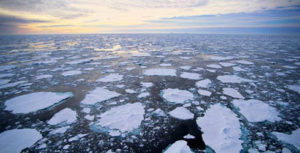 Since 1992, the temperatures around the world have been consistently rising, year after year. 2015 was proclaimed as the hottest on record, and the effect it has had on water has been significant. The polar ice caps have been melting due to this shift, and large chunks of glaciers are beginning to crumble, fall, and break off into the ocean and melt away.
Since 1992, the temperatures around the world have been consistently rising, year after year. 2015 was proclaimed as the hottest on record, and the effect it has had on water has been significant. The polar ice caps have been melting due to this shift, and large chunks of glaciers are beginning to crumble, fall, and break off into the ocean and melt away.
The changing face of the polar landscape
Glaciers are important sources of the world’s fresh water. Their steady decline is a disturbing indicator of what could happen in the future. Globally, glaciers are estimated to be losing 92 cubic kilometres of ice per year. That’s enough water to sustain homes, farms, and factories in Antigua for decades.
Once these natural freshwater resources are depleted, they are gone for good. Those areas reliant upon the icy giants will have to seek their water elsewhere.
Reliance on mountain runoff and snow melt
Snowmelt is a slow trickle that keeps freshwater flowing consistently into reservoirs, both natural and man-made. Thanks to higher temperatures due to global warming, this is no longer happening as it should. The rise in temperature means the amount of snowfall declines while rainfall increases, which may seem like a good thing on the surface, but rainfall is not as valuable as the water produced from the melting of snow in the mountains every season. To understand why that is and the impact of this shift, it’s important to realize the world’s relationship with snow.
More than 50% of the world’s freshwater comes from mountain runoff and snowmelt. Snow on the mountains provides a slow feeding of reservoirs and water storage areas, making it possible to contain that water to be used all year round. If there’s no snow, however, the rains come more forcefully. The intensity of storms has shifted in the last 50 years due to the changing water cycle. The amount of rain falling during the most intense 1% of storms has increased by 20%. The ferocity and immediacy of these storms make it impossible to capture and hold the rain. Reservoirs become overwhelmed and the runoff can’t be contained. Water is wasted and lost, creating shortages again, even after a rainy season.
Water conservation and energy reduction
Conservation is important, and finding ways to save water is becoming more important than ever. This is a global issue, not just something that affects certain areas. Even those countries that are drought-free need to be aware of the impact, because many are being called upon to step up and provide water to others. As this continues and the climate shift goes on, coming up with plans of action to make things function more effectively with water storage and collection will be vital on a global scale.
